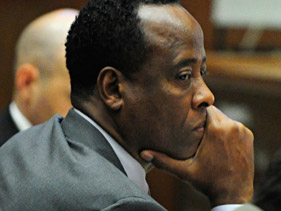Two lawyers watching the case weigh in on who presented strongest argument in Conrad Murray trial. By Gil Kaufman Dr. Conrad Murray (file) Photo: Getty Images It’s up to the jury now. After six weeks of testimony , the seven-man, five-woman jury in the involuntary manslaughter case of former Michael Jackson doctor Conrad Murray began their deliberations Friday morning (November 4). They’ve heard from 49 witnesses, including some of Jackson’s former employees, a number of Murray’s girlfriends and patients, medical experts, police investigators and ER workers. In closing arguments on Thursday, prosecutor David Walgren told them the evidence the state presented was “overwhelming” and showed that it was “abundantly clear” that Murray caused Jackson’s death by acting in a negligent manner in providing the singer with the surgical anesthetic propofol in a non-hospital setting. It capped weeks of prosecution testimony that pointed to the many alleged breaches of professional conduct by Murray, who Walgren painted as an opportunist lured by a big payday into providing medical services that were out of the norm, dangerous and, ultimately, deadly. Defense attorney Ed Chernoff countered with arguments that investigators were sloppy in collecting evidence and that it was Jackson, not Murray who was to blame because, according to the defense, the 50-year-old singer self-administered the fatal propofol dose that took his life on June 25, 2009. As we await the jury’s verdict, we asked a pair of lawyers not affiliated with the case to break down both sides’ arguments and weigh in on how each did in presenting their cases. “If he’s convicted, I’m not sure it will be due to any tactical errors on the part of his defense team,” said Robert Weisberg, a law professor at Stanford University and faculty co-director of the school’s criminal justice center. “This case does not jump out at me as one where there was any alternative strategy. If he’s convicted, it’s because he’s guilty, and based on the evidence it’s not looking good for him.” Weisberg praised the prosecution’s case, pointing out the strength of the rebuttal testimony of prosecution anesthesia expert Dr. Steven Shafer, who was recalled to the stand to poke holes in the alternate death scenario laid out by defense witness Dr. Paul White . Los Angeles-based criminal defense attorney Mike Cavalluzzi said he thought the prosecution told a “great and very tight” story over the course of the trial, beginning with Jackson’s longtime confidant and director/choreographer Kenny Ortega . It was the “This Is It” director who opened testimony in late September by telling the jury “my friend wasn’t right,” setting the chaotic scene at the rehearsals for the show. As for the investigative mistakes that Murray’s lawyers pointed out during their cross-examination of prosecution witnesses, Cavalluzzi said he felt those arguments were “grasping at straws” by the defense and had no real relevance to the negligence accusations against Murray. “Those felt like red herrings,” said Cavalluzzi, who has worked a range of criminal matters in L.A. courts from misdemeanor battery to homicide. “There was very compelling evidence from doctors about the extreme deviations from standard care by Murray even before June 25, by administering propofol in a residential setting and then laying out, piece-by-piece, how many deviations there were.” He also said that the testimony of nurse practitioner Cherilyn Lee , who was called by the defense, was very compelling. “I’m not sure it helped the defense,” Cavalluzzi said. “She said Jackson was begging for propofol and she knew never to accede to that request. It made the defense position so difficult when every objective medical professional said the conduct Murray engaged in was extremely dangerous.” What could the defense have done differently? Weisberg said he wouldn’t fault them for the case they put up, aside from what he called the very unusual tactic of voluntarily having Murray speak to police in a taped interview two days after Jackson’s death. The jury has to bring back a unanimous verdict on the single felony count, and Cavalluzzi said what they most likely took away from the testimony of the doctor and nurses who took the stand for the defense is that Murray should not have been administering propofol to any patient, let alone someone who clearly had substance abuse issues like Michael Jackson. “The character witnesses were brought up to make you think that Dr. Murray is a nice person, but involuntary manslaughter is not a crime of moral turpitude,” Cavalluzzi explained. “It is not a crime which bad people engage in bad behavior. Nobody is accusing Dr. Murray of stealing or intentionally harming anyone. What they’re saying is that he may have been a good man who made a horrible mistake and that the mistake that he made rises to criminal negligence, which makes him guilty of involuntary manslaughter.” If Murray gets off, though, Cavalluzzi predicted it would be because of his generous reputation as laid out by former patients , which could cause some doubt as to whether Murray did something that killed Michael Jackson or if Jackson administered the fatal dose himself. “It’s a very, very tough case,” he said. “I think it’s compelling in so many ways, as an insight into the genius of Michael Jackson and the price he paid … he wanted to deliver such an extraordinary concert and that, it killed him.” MTV News will be covering the Conrad Murray verdict live. Go to MTVNews.com for breaking news, reactions and analysis from Los Angeles or tune to MTV for the latest updates. Related Videos Remembering Michael Jackson – One Year Later Related Photos Michael Jackson: A Life In Photos Related Artists Michael Jackson

Read the original post:
Michael Jackson Doctor Trial: Sizing Up Defense, Prosecution Cases
























